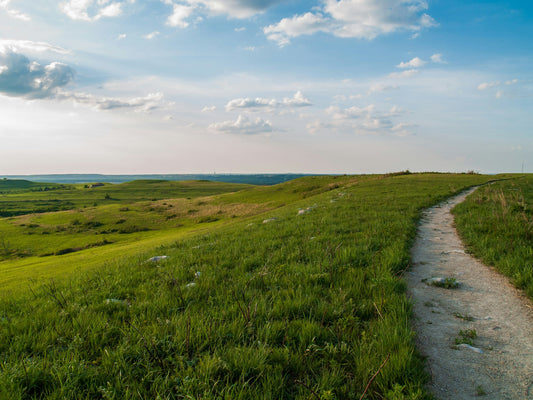Does Delta 9 THC Help with Sleep?
Does Delta 9 help you sleep? That's the question many have been asking for a long time. While additional research is required, studies suggest that there is potential showing that THC can help people fall asleep faster and potentially improve their overall sleep quality.
Today, scores of people around the world are considering cannabis to treat a range of medical conditions and symptoms, including various sleep disorders. As the most prevalent compound in the cannabis plant, Delta 9 THC has emerged as a prominent figure, with many holding the belief that it can potentially treat their sleep issues. These feelings are often based on a growing number of lab studies and decades of anecdotal feedback.
The legalization of cannabis has helped millions across America legally try THC for a number of reasons, including finding sleep improvements. The 2018 Agricultural Improvement Act, or the Farm Bill, provided a significant turning point. Under the law, Delta 9 THC derived from hemp was now federally legal as long as it contained a concentration of .3% or less THC.
Still, despite the growing legal access to the plant and Delta 9 THC edibles, many remain uncertain about its sleep potential. Read on to learn more about what we know so far to answer the question as best we can, does Delta 9 THC help with sleep?
What is Delta 9 THC?
Delta 9-tetrahydrocannabinol, more commonly known as Delta 9 THC or simply THC, is the primary compound found in the cannabis plant. Of the hundreds of known compounds in a cannabis strain, THC is no doubt the most well-known today.
THC's well-known status and popularity are primarily supported by its prevalence in the plant and its primary effects. Known for producing a psychoactive effect that many people consider a "high," Delta 9 is responsible for producing a range of mentally and physically beneficial effects. Through various studies and anecdotes, the reported possible effects include benefits such as:
- Euphoria
- Low blood pressure
- Pain relief
- Inflammation relief
- Mental health relief (in certain conditions)
- GI relief
- Anti-cancer properties
- Sleep improvements
The various therapeutic effects are created when THC interacts with the body's endocannabinoid system (ECS), a complex system of nerves and receptors found in humans and animals. THC notably interacts with the brain and body's CB1 and CB2 receptors, which induces several effects many find beneficial to one or more symptoms or conditions they live with [1].
Years of plant prohibition stunted our understanding of cannabis and its various possible effects. However, thanks to the legalization of the Farm Bill, we are beginning to understand the plant and its role in sleep a bit more. Still, a significant deal of research is required to fully understand how the two elements interact.
Additional research barriers may fall if the US Drug Enforcement Agency (DEA) follows through on Health and Human Services' (HHS) recommendation to reschedule cannabis from Schedule I to Schedule III on the US-controlled substances list. Doing so would lower research barriers, likely providing us with further understanding in the years ahead. These findings may also lead to increased FDA-approved cannabis-derived drugs, but that is speculation at this point.
Does Delta 9 THC Make You High?
Yes, in fact, Delta 9 THC is the primary psychoactive cannabinoid responsible for the "high" we associate with cannabis. But how is it made possible?
It is all made possible thanks to THC's chemical structure. Closely resembling the naturally occurring brain chemical anandamide, THC is allowed to interact with various cannabinoid receptors. The high is created when THC interacts with CB1 brain receptors, which disrupts or alters typical brain communications with the body and various other functions.
The effect on these functions can trigger an array of often beneficial effects, including:
- Euphoria
- Pleasure
- Laughter
- Couch-lock or sedation
Adverse side effects can also occur, including decreased cognitive functions, which can lessen a person's ability to remember, think, or carry themselves in a coordinated manner. In some more extreme cases, a person may experience severe side effects, including psychosis and substance abuse [2].
Sleep Disorders and Insomnia
Sleep disorders are an increasingly prevalent condition in the US and the world at large. Some reports suggest that approximately 70 million American adults will experience symptoms at some point. While many sleep disorders and symptoms exist, insomnia is particularly prevalent, with the condition affecting roughly 40 million Americans, 15% of those are reported to experience chronic symptoms.
Sleep disorders comprise an extensive range of conditions, which can adversely affect sleep patterns, sleep quality, onset time, duration, and other critical factors. Common types of sleep disorders include:
- Abnormal Sleep Behavior Disorders
- Bruxism
- Central Sleep Apnea
- Chronic Fatigue Syndrome
- Circadian Rhythm Sleep Disorders
- Excessive Sleepiness
- Hypersomnia
- Insomnia
- Narcolepsy
- Night Terrors
- Non-24-Hour Sleep Wake Disorder
- Obstructive Sleep Apnea
- Parasomnias
- Periodic Limb Movement Disorder
- Rhythmic Movement Disorder
- REM Sleep Behavior Disorder
- Restless Leg Syndrome (RLS)
- Shift Work Disorder
- Sleepwalking
- Sleep Apnea
- Sleep-Related Breathing Disorders
- Sleep-Related Movement Disorders
- Sleep Paralysis
The rising prevalence of insomnia and other sleep disorders has led countless individuals to seek out one or more sleep aids and techniques to improve their rest. Medical cannabis is one of those options gaining in popularity [3] [4] [5].
Does Delta 9 THC Work As A Sleep Aid?
Historical and modern use of cannabis leads many to believe that Delta 9 THC and many other plant compounds may serve as a viable natural sleep aid. While additional research is needed to understand most, if not all, aspects of how cannabis and sleep interact, several findings suggest that there is some connection between the plant and improved sleep.
Through various analyses, researchers have noted that cannabis plays a beneficial role in providing therapeutic relief to a variety of individuals suffering from conditions such as PTSD, chronic pain, and various inflammation pains and diseases. These effects and other reported benefits provide evidence that suggests cannabis can reduce nighttime wakefulness while maintaining sleep duration.
The promising results so far suggest that THC's psychoactive effects and ability to interact with sleep-regulating receptors like the CB1 and CB2 receptors make it a potential option for improving sleep duration and quality.
Research over the years has shown that THC demonstrates the ability to decrease sleep onset latency, providing potential relief for individuals with insomnia and other sleep disorders. However, research has also noted that some patients have continued to experience issues with waking up during their rest period.
While it is believed that the psychoactive properties and numerous reported benefits of Delta 9 THC make the compound a viable sleep aid, additional research is required to verify these findings. At this time, it is primarily understood that cannabis can play a beneficial role in conditions such as PTSD, chronic pain, and multiple sclerosis. Still, we do not understand the full long-term impact cannabis may have on these individuals or others using cannabis to improve their rest.
Many results have proven to be positive, but consumers still need to be aware of the uncertainties surrounding the cannabis and sleep connection [6] [7] [8] [9] [10].
Which Delta 9 product should you take to help you sleep?
Each cannabis consumption method offers its own pros and cons, depending on your preferences and needs. When considering a cannabis product for sleep, remember some of the following critical points:
Edibles
- Slower onset (usually 30-120 minutes) with longer-lasting effects may be ideal for sleep throughout the night.
- Precise, consistent dosing makes it easier to track your needed serving.
Smoked and Vaped Cannabis
- Near-immediate effects may help reduce sleep onset latency.
- Often inexact dosing.
Tinctures
- Under-the-tongue consumption produces effects in minutes, with effects lasting somewhere between smoked/vaped and edible options.
- Ideal dosage control when using a measured dropper.
Topicals
- Non-psychoactive. Contents, unless specified, will not reach the bloodstream.
- Localized relief provides potential relief to muscles and joints.
- You will only feel the effects on the skin area where the topical is applied.
We Know a Great Edible You Should Try
Snoozy Delta 9 THC Gummies for Sleep help you get the rest you need when you can't doze off as intended. Each Delta 9 THC gummy is designed for sleep, containing hemp-derived, sleep-inducing cannabinoids such as Delta 9 THC, CBD, and CBN. We combine our edibles with all-natural chamomile and L-theanine to further promote restful sleep.
Formulated with organic and natural ingredients to help you get the rest you deserve, Snoozy edibles aim to improve your sleep quality while tasting great. Pick up a pack today!
Want to learn more about how sleep and cannabis may work together? Head to the Snoozy blog to discover much more about their connection and many more important points about Delta 9 THC, sleep, and a ton more.









